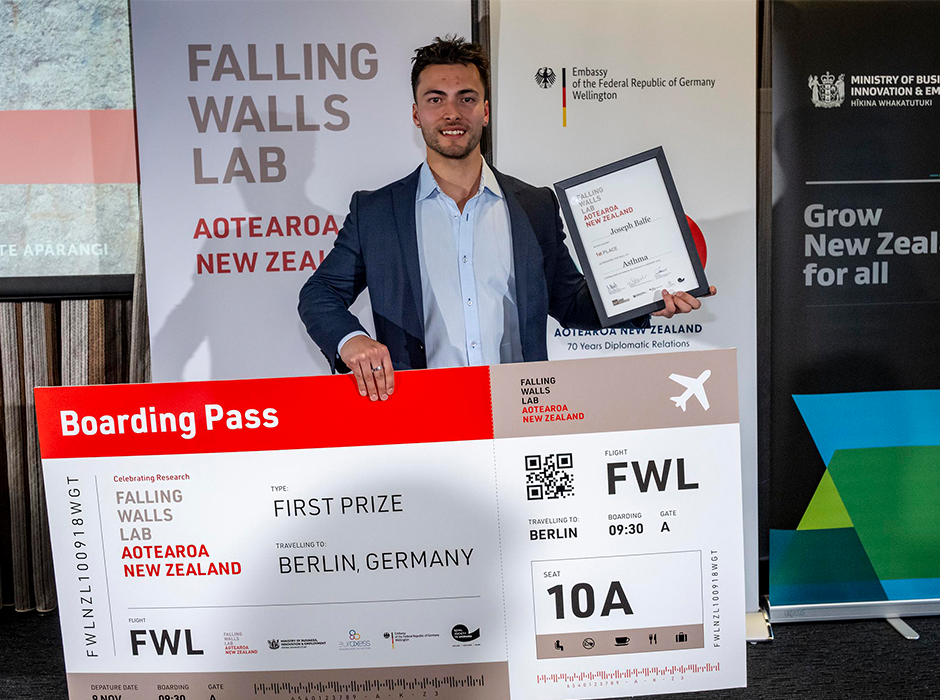
Joseph Balfe receiving his 2024 Falling Walls Lab Aotearoa New Zealand pitch competition prize.
Joseph Balfe’s passion for non-invasive wearable technologies to treat health disorders has won him a major award and a trip to Germany.
Joseph, who graduated from Otago last month with a Master of Science, was the overall winner in the 2024 Falling Walls Lab Aotearoa New Zealand pitch competition, for his project that’s developing a wearable smart-device to detect and relieve asthma attacks.
He is proud to represent New Zealand at the Global Finale during the Falling Walls Science Summit in Berlin in November.
“I am really looking forward to spending the week mixing with global leaders in science and innovation, and I hope to build as many connections as I possibly can. This is an important event to showcase globally relevant innovations, and ultimately, to foster international collaboration in solving some of humanity’s pressing challenges,” he says.
The award recognises that Joseph’s project – which he started during his masters study - could make a real difference for society.
Every day, the lives of more than 1,000 people are cut short because of an asthma attack, and most of these deaths are preventable due to a simple delay in obtaining inhaled medications during the final attack, he says.
Joseph’s three-minute pitch explained how the smart, wearable, bronchodilator device he’s developing uses advanced technology to detect and rapidly intervene during asthma attacks through opening the lung airways with nerve stimulation.
Joseph graduated with a Master of Science with distinction in Neuroscience last month, after completing a Bachelor of Science in 2022 and a Bachelor of Music in 2019.
His passion for neuroscience was initially sparked by a concern for mental health, which was magnified through noticing mental health issues during his work as a sub-warden in the residential colleges.
“I started studying neuroscience to deepen my curiosity. Throughout my degree, I became particularly fascinated by the emerging field of non-invasive wearable technologies in treating disorders of the nervous system, as I recognised the limitations of many traditional pharmaceutical treatments.”
This led him to pursue his master’s study with Associate Professor Yusuf Cakmak from the Department of Anatomy.
“In our very first meeting, we discussed this idea of using neuromodulation for asthma by simply harnessing the interconnectivity of the nervous system. While it seemed a bold idea, I decided to take on the challenge and figure out how we could achieve this.”
Joseph conducted three human studies in his masters, all showing promising results for this novel approach to open the airways. Clinical trials to validate the technology are now planned.
“I’m committed to leveraging the therapeutic potential of neuromodulation technology to solve biomedical problems.”
Joseph is now a Clinical Trials Associate at Pacific Edge Ltd, a world-leading cancer diagnostics company specialising in non-invasive genomic urine testing for bladder cancer. His role supports the clinical trials across the Asia-Pacific region.
The recent Falling Walls Lab Aotearoa New Zealand event was held by the Royal Society Te Apārangi, with support from the German Embassy in Wellington, the Ministry of Business, Innovation and Employment (through the Catalyst Fund) and EURAXESS Australia & New Zealand.
Kōrero by Claire Grant, Communications Advisor, School of Biomedical Sciences